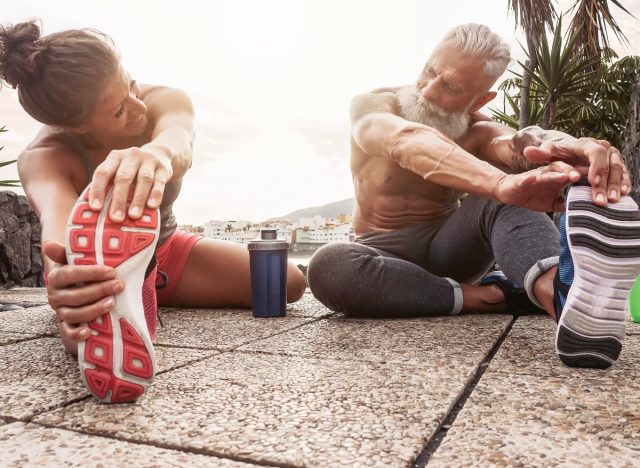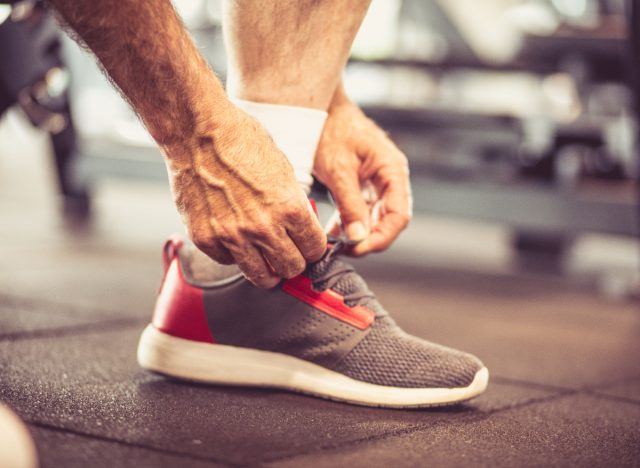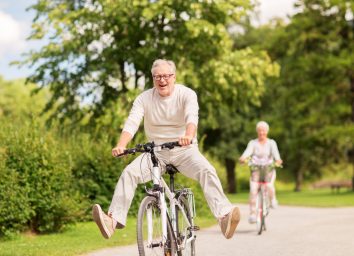This One Group Of People Holds The Key To Staying Young, Study Says

There’s a secret key to staying young, but you need to start it early, according to a recent study performed by the University of Copenhagen, Denmark. What’s the secret to a younger you? Well, it’s all about consistently keeping your muscles strong. Doing so regularly throughout your life is the formula to remaining youthful, this new study reveals. We’ve got the scoop, so read on to learn more, and next, check out The 6 Best Exercises for Strong and Toned Arms in 2022, Trainer Says.
Your muscles are so important to your overall health and survival

First off, it’s important to understand just how critical your muscles are. You don’t simply need them to look strong and buff; muscles are necessary for you to survive. Your heart is a muscle—in fact, according to Michigan State University, it’s the “strongest muscle” in your entire body! Your muscles give you strength and allow you to get exercise and lead an active lifestyle. Read on to find out why you really need to step up and give them the attention and TLC they truly deserve.
Related: Drink This Much Water Each Day To Prevent Heart Failure, New Study Says
Staying “recreationally active” throughout your life may be the fountain of youth you’ve been seeking

A recent study published in The Journal of Physiology found that keeping your muscles healthy by staying “recreationally active” regularly throughout your life is the fountain of youth you may be looking for. You heard that right—staying active consistently can protect your body from losing muscle mass and the functionality that happens naturally as you age.
This first of its kind research examined nerve activity, stem cells, and muscle in men 68 years of age and older. The study found those who have consistently lived a physically active life have healthier aging muscles. When it comes to fatigue, their muscle has a greater resistance when compared to inactive people at every age. The muscle in the active individuals was found to have more muscle stem cells (satellite cells). Satellite cells preserve your nerves; they are needed to regenerate muscle along with growth throughout your life.
The active individuals were found to be involved in various, consistent exercise throughout their lives, including biking, racket/ball sports, swimming, resistance exercise, rowing, and/or running.
Related: How To Extend Your Life Like The World’s Longest Living Couple
Here’s how the study played out

If you’re curious about staying young, here’s how the study went down. Researchers observed 46 males averaging 73 years of age. The men were broken out into three categories: 15 “elderly sedentary,” 15 “young sedentary,” and 16 “elderly lifelong exercise.” Each participant was asked to complete a heavy resistance exercise, including a knee extension while sitting in a mechanical chair. During the task, researchers took blood samples and muscle biopsies to observe their muscle function. They also measured the force each participant used during the test. The study discovered the “elderly lifelong exercisers” group outperformed the young sedentary and elderly participants.
These findings are key in further research on muscle health, exercise, and staying young

Casper Soendenbroe, lead author of the study at the University of Copenhagen, Denmark explains, “This is the first study in humans to find that lifelong exercise at a recreational level could delay some detrimental effects of [aging]. Using muscle tissue biopsies, we’ve found positive effects of exercise on the general [aging] population.” Soendenbroe notes past research has mostly been based on professional athletes, which is such a small percentage of individuals. This research better represents a larger population of 60 year olds and up, which is when most people may partake in activities at a more “moderate level.”
“That’s why we wanted to explore the relation between satellite cell content and muscle health in recreationally active individuals. We can now use this as a biomarker to further investigate the link between exercise, [aging] and muscle health,” Soendenbroe says, adding, “The single most important message from this study, is that even a little exercise seems to go a long way, when it comes to protecting against the age-related decline in muscle function. This is an encouraging finding which can hopefully spur more people to engage in an activity that they enjoy. We still have much to learn about the mechanisms and interactions between nerves and muscles and how these change as we age. Our research takes us one step closer.”









